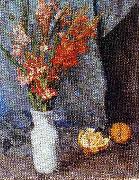China al por mayor de Marco de Oleo |
|||||||||||

|
|||||||||||
|
|
|
||||||||||||||
|
Carl Schuch
(30 September 1846 - 13 September 1903) was an Austrian painter, born in Vienna, who spent most of his lifetime outside Austria, in Germany, Italy and France. He painted primarily still lifes and landscapes. During the period 1882-94 he was based in Paris, where he was greatly impressed by the work of Claude Monet whom he described as "the Rembrandt of plein-air painting" although he was attracted most of all to Rembrandt and the artists of the Barbizon school. In 1884 and 1885 he spent the summer months in the Netherlands, studying the Dutch old masters as well as the contemporary painters of the Hague School, and filling notebooks with detailed descriptions of the colors he observed in paintings that he admired. Of all the artists belonging to the circle around Wilhelm Leibl (called the Leibl-Kreis), Schuch was the most devoted to color. His work marks the transition from the realist tradition to the modern movement in Vienna, esthetically, however, it is far from contemporary trends, and from its means and ends, comparable to Paul Cezanne (Gottfried Boehm, referring to Arnold Gehlen). |
||||||||||||||
|
|
||||||||||||||
|
||||||||||||||
|
|
||||||||||||||
| Carl Schuch
(30 September 1846 - 13 September 1903) was an Austrian painter, born in Vienna, who spent most of his lifetime outside Austria, in Germany, Italy and France. He painted primarily still lifes and landscapes. During the period 1882-94 he was based in Paris, where he was greatly impressed by the work of Claude Monet whom he described as "the Rembrandt of plein-air painting" although he was attracted most of all to Rembrandt and the artists of the Barbizon school. In 1884 and 1885 he spent the summer months in the Netherlands, studying the Dutch old masters as well as the contemporary painters of the Hague School, and filling notebooks with detailed descriptions of the colors he observed in paintings that he admired. Of all the artists belonging to the circle around Wilhelm Leibl (called the Leibl-Kreis), Schuch was the most devoted to color. His work marks the transition from the realist tradition to the modern movement in Vienna, esthetically, however, it is far from contemporary trends, and from its means and ends, comparable to Paul Cezanne (Gottfried Boehm, referring to Arnold Gehlen). oil on canvas Dimensions 80 X 62.5 cm cyf |
||||||||||||||
|
Related Paintings to Carl Schuch :. |
||||||||||||||
|
|
||||||||||||||
|
|
||||||||||||||
|
CONTACTE EEUU |







